David Lynch’s Lost Highway (1997): Criterion Blu-ray review
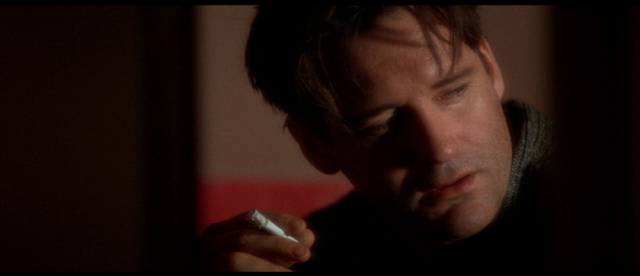
In a career marked by dark and disturbing movies, David Lynch’s Lost Highway (1997) may be the darkest and most disturbing. After the poor critical and commercial reception of the misunderstood Fire Walk With Me (1992), Lynch spent the next five years dabbling in television (On the Air, Hotel Room) and music videos before French funding made it possible to launch another project. Co-written with Barry Gifford (Wild at Heart), Lost Highway seems almost like a wilful act of defiance towards those who had turned against Lynch when he released FWWM. Dense and confusing, the new movie made no allowances, demanding that the audience follow the filmmaker down a conceptual rabbit hole from which there appeared to be no way out.
Lost Highway is filled with dread from the opening frames and this mood never lets up, even in seemingly lighter moments. The characters live in a perpetual state of fear and discomfort in a world which denies the very possibility of security or happiness. This is Lynch’s version of film noir, a world of weak men and seductive but dangerous women, but where traditional noir is rooted in a recognizable reality-based world, Lost Highway slides inexorably into the murky quicksand of a subjective universe, a place where reality is subsumed and distorted by paranoia and desperation.
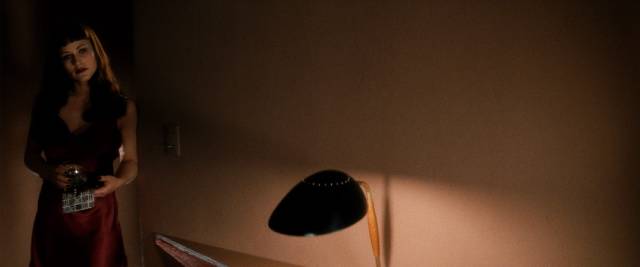
The strangely fractured narrative is disorienting, but Lynch’s explanation of the project’s origins only goes so far in clarifying things for the viewer. It began, he says, with the O.J. Simpson trial and wondering how someone who had obviously committed two brutal murders could simply get on with their life as usual, apparently untroubled, relaxing on the golf course … and then Lynch came across the concept of the psychogenic fugue, a mechanism by which a stressed mind is able to disassociate from unbearable memories, protecting itself by concealing what threatens it.
On a superficial level, this explains certain things about Lost Highway’s structure: Fred Madison (Bill Pullman), a jazz musician, is haunted by jealousy and distrust of his wife Renee (Patricia Arquette). Strange events push him deeper into his delusions and he brutally murders Renee, is convicted and sent to death row. Trapped in an unbearable position, his mind fractures and “escapes” into another identity, that of mechanic Pete Drayton (Balthazar Getty), who becomes involved with Alice Wakefield (Arquette again), the mistress of mobster Mr. Eddy (Robert Loggia). This apparent escape into another reality, however, folds back on itself and Pete’s life leads back towards the intolerable state which Fred was running from. In the film’s final moments his mind is completely disintegrating from the stress, racing into inescapable darkness.
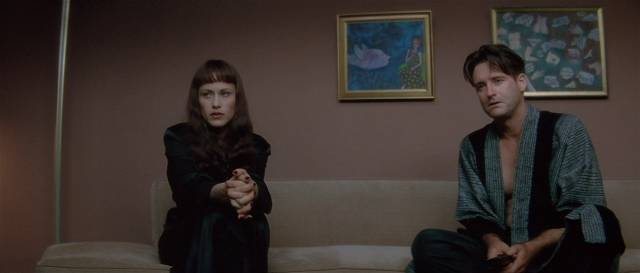
But this movie is not a mere depiction of a particular psychological state, because the two worlds both exist with equal reality and are inextricably bound up with one another. That is, in narrative terms, both are objectively “real” and Fred Madison’s consciousness is trapped wherever he finds himself. Lost Highway exists in a purely cinematic reality; everything we see, everything the characters experience, has equal weight, with no clear boundary between subjective and objective … which is to say that it is the quintessentially Lynchian film, a self-contained state of mind into which the receptive viewer is immersed, a kind of waking nightmare – just as almost all his films are, from Eraserhead to Inland Empire.
Even in the first act, which would seem to establish a baseline reality in contemporary Los Angeles, the uncanny intrudes into the troubled marriage of the Madisons. Despite living in a modernist house with large windows looking out on a canyon road, Fred and Renee are submerged in darkness, the Spartan interior of their home a place of deep shadows broken by weak pools of light. Fred broods and smokes while Renee seems uneasy; we sense something dangerous in him and her attempts to placate, to be reassuring. When she says she wants to stay home and not come to the club to hear him play, he asks what she’ll do and she says “read”. “Read what?” he asks, his tone a mix of amusement and disbelief. Later, between sets, he phones home and there’s no answer.
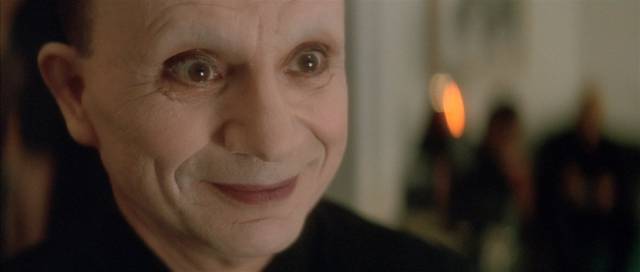
In the morning, fetching the paper from the front step, Renee finds an envelope with a VHS tape inside. They sit down to watch it. A slow pan across the front of their house is enigmatic and vaguely menacing. The next day another tape, more disturbing, begins with the same pan across the front of the house, but then cuts to the living room, the camera up close to the ceiling, tracking through the shadowy hallway and into the bedroom where it pauses to look down on them sleeping. Two detectives called in to investigate have no answers, but they seem suspicious of the couple.
Fred reluctantly accompanies Renee to a party given by Andy (Michael Massee), an old acquaintance of hers. Fred watches them suspiciously. Standing at the bar and drinking a couple of quick shots, he sees a strange man walking towards him. Mystery Man (Robert Blake), with penetrating eyes staring from an unnaturally white face, provides one of the most unsettling moments in all of Lynch’s work, introducing an inexplicable touch of the supernatural into an already uncanny atmosphere: he tells Fred they’ve met before at the Madison house. “In fact,” he says, “I’m there now,” and hands Fred a mobile phone, telling him to call the house. When Fred dials home, the voice of the man staring at him answers. There’s no rational explanation for this figure; it’s as if Fred’s increasing paranoia has been physically manifest in a demonic form.
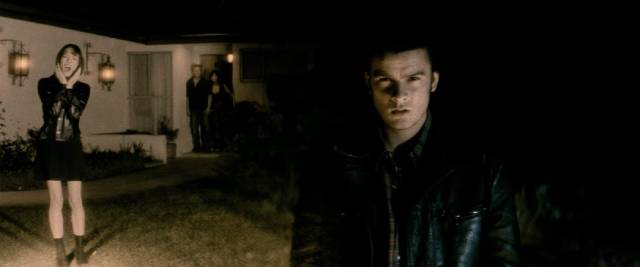
Reality is collapsing and although he has no clear memory (we see shocking images in grainy video which suggest an inevitable progression from the strange videotapes left on the front step) Fred has apparently killed Renee in a horrific way, her dismembered body scattered in the bedroom. The two detectives have no hesitation in believing that he’s the killer; nor does the court, which sentences him to death.
On death row, he’s plagued by increasingly severe headaches, and one night the split occurs – a guard discovers that it’s no longer Fred in the cell, but a younger man eventually identified as mechanic Pete Drayton. Prison authorities, with no explanation for this substitution, have no choice but to release Pete into the custody of his parents (Gary Busey and Lucy Butler), who remain uneasily silent about what happened “the other night” when Pete disappeared.
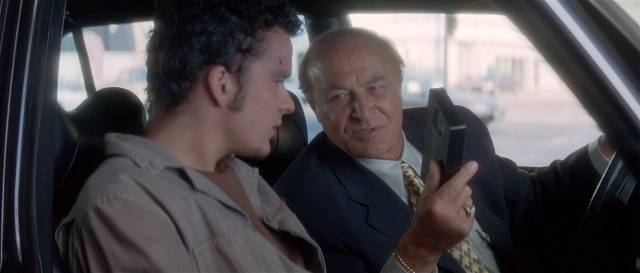
With no idea what has happened to him, Pete resumes his life – working at the garage owned by Arnie (Richard Pryor), seeing his girlfriend Sheila (Natasha Gregson Warner), and fixing the car of Mr. Eddy, a volatile gangster who provides the continuing undertone of potential (and actual) violence which binds this new reality to the world of Fred Madison. Also forging a connection between these two worlds is Mr. Eddy’s girl Alice, a blonde doppelganger for the dark Renee. While the first act was like a horror movie about marriage, the second section is closer to classic noir – the naive Pete falls for Alice against his better judgment, even though he’s told directly by Mr. Eddy that he’ll kill anyone who gets involved with her.
Alice has the slippery indeterminacy of a noir femme fatale – seemingly sweet and guileless, she became involved with Mr. Eddy through Andy, a pornographer, and she proposes that Pete help her to rob Andy so they can run away together. The plan inevitably goes wrong and Andy ends up dead, while Alice becomes harder once she has the loot and it’s clear that she’s been using Pete as a way to free herself from Mr. Eddy. (Arquette’s dual performance presents an interesting contrast with Sheryl Lee’s in FWWM; while the latter is a devastatingly raw depiction of a woman’s very real emotional pain and vulnerability, the former is a projection of the male characters’ desire and distrust, an idea of Woman conjured by Fred’s paranoia and Pete’s immature fantasy.)
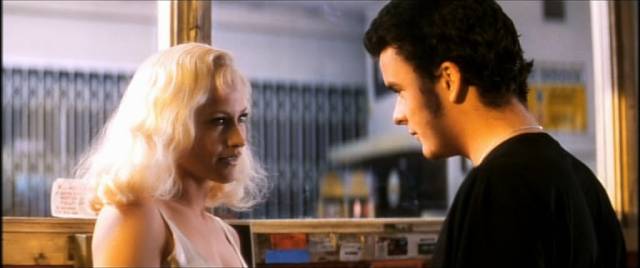
As everything goes wrong, Pete’s world begins to break apart and Fred starts to force his way back in, with Mystery Man becoming involved again, provoking more violence – but this is not a return to the world of the first act; rather it’s a synthesis of the two worlds, doubling back in time. Although Pete’s story seemed to offer some kind of escape from Fred’s unbearable situation, it ultimately leads him back to the house where he may or may not have murdered Renee. There’s no way out and his final desperate attempt to flee, racing down a highway at night in Mr. Eddy’s Mercedes with the cops in pursuit, seems to be going nowhere and, behind the wheel, Fred is tearing into fragments, losing his identity on the way to oblivion.
Throughout his work, Lynch has created narrative worlds which seem to touch the one in which we exist while suggesting some other, parallel reality. These worlds are visceral, with a material density which is unsettling. He draws us into psychological depths which are simultaneously enthralling and repellent. These imagined worlds are fraught with danger, madness and violence, but he presents them with such unerring conviction that they seem to show us things about our own reality we might rather not know. It’s ironic, but perhaps not surprising, that The Straight Story (1999), the film which most closely reflects our own reality rather than his imaginary worlds, is Lynch’s warmest and sweetest work in which his personal creative demons are held at bay.
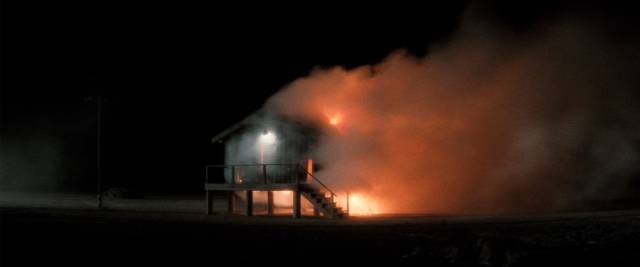
In Lost Highway, Lynch’s ability to create unsettling moods is at its most refined. Through imagery which conceals more than it reveals, and performances which are strangely off-kilter (his ability to imbue banal dialogue with menacing undercurrents through unnatural rhythms and awkward pauses creates almost unbearable tension in scenes which don’t seem to warrant it), and through his signature sound design which combines ominous ambiences, music, effects and dialogue into a dense aural equivalent of the mysterious visuals, he somehow builds his strange dreams so that they inhabit the audience’s consciousness in a way few other filmmakers are capable of.
The disk
Criterion’s release uses a 4K scan from the original negative, well supporting the often very dark imagery. Colours are subdued (there’s some criticism on-line about this, which may be justified given comparisons to earlier releases, though Criterion’s master was approved by Lynch himself), but there’s a lot of detail and authentic grain. The disk includes a stereo track and a 5.1 remix, which fully support Lynch’s sound design.
The supplements
There are a couple of archival extras – an interview with Lynch from 1997 (11:25), in which he talks about the origins of the film, and a making-of (13:03) in which Lynch, Pullman, Arquette and Loggia talk about working with each other – as well as Toby Keeler’s 1997 feature-length documentary Pretty as a Picture (1:20:34), which includes a lot of material shot during the production, but also covers Lynch’s entire career up to that point.
There’s also an audio extra with Lynch and Kristine McKenna reading from the chapter on Lost Highway in Room to Dream, their collaborative book on Lynch’s life and work (43:39).
The booklet reprints the section on Lost Highway from Chris Rodley’s collection of interviews, Lynch on Lynch.
It’s worth tracking down David Foster Wallace’s lengthy essay about the production from Premiere in 1996 (reprinted in his non-fiction collection A Supposedly Fun Thing I’ll Never Do Again, 1997). Wallace is wonderfully observant and insightful about Lynch and the strange mix of business and art in filmmaking.
Comments
I enjoyed the review, but there is a small typo: it is Sheryl Lee, not Cheryl.
Thanks … no matter how many times I proofread, errors still manage to slip through!